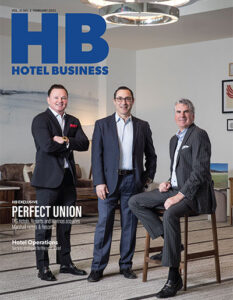In order to get to the point where they are now, both TPG Hotels, Resorts and Marinas (TPG) and Marshall Hotels & Resorts have had to weather the storm that has been the COVID-19 pandemic. Both companies had to make tough decisions about their properties and personnel during the height of the crisis, but they had been through downturns before and knew what they had to do to get through the worst period in the history of the industry.
Mike Marshall, the former president/CEO, Marshall Hotels & Resorts, who now serves in the same role at TPG, had been through three other economic downturns. He recognized early on that there could be an opportunity in the midst of challenge for his company.
“I didn’t lay off or furlough any of our corporate staff; we kept everybody,” he said. “We took care of our existing owners and actually added a few properties at the time, too. We never really shut any properties down, except for maybe one or two months at a time.”
He added, “We still have hotels that are in markets that are not doing as well [as they have in the past], but we’ve had a lot of hotels in resort areas where we’ve had the best years ever. In 2021, as a management company, we did 20% better in revenue than we did in 2019. So, we were very proactive knowing that there’s always a light at the end of the tunnel, but having been through it before, we knew what to expect and we approached it appropriately.”
TPG is a subsidiary of a greater organization, Procaccianti Companies, so, as Rob Leven, chief investment officer, Procaccianti Companies | TPG Hotels, Resorts and Marinas, said, “The breadth of the overhead and the organization is much different than it is if we were simply a third-party management company.
“There were some difficult decisions that had to be made from a personnel perspective and from a cost perspective, both at the corporate level as well as the property levels,” added Leven. “A lot of people were doing a job-and-a-half or two jobs to help get us through. All the hands that we had were on deck.”
He continued, “This is our fifth downturn, so it wasn’t completely unchartered territory, although I don’t think we’ve ever had hotels go from 80% to 10% occupancy for any more than a few days or a week. We just navigated [the pandemic]to the best of our abilities. The PPP [Payroll Protection Program] helped tremendously, both at the property level and at the corporate level. That was a huge lifeline for everybody. Without that, the hotel industry would’ve been a complete train wreck.”
Ralph Izzi, VP, corporate marketing & public affairs, Procaccianti Companies, noted that the company has to shutter two hotels “one that was our investment partner’s decision and one was due to a county ordinance. It was in one of the California properties that had to close for two weeks or six weeks.”
A few years before the pandemic, the company divested in a number of large, full-service properties and began acquiring smaller, leisure-oriented, independent hotels, including seasonal properties in the Northeast.
“We got very fortunate in terms of the timing of the way everything played out, because there was a period of time where things cleared for a moment,” said Leven. “I think it was the spring of ’21, and everybody went hog wild into the summer and was a huge summer in a lot of these Northeastern seasonal properties, and they did really well—better than a lot of them did in ‘19.”
Then, Delta variant made its way across the country at the end of the summer. “It helped that we didn’t have as many 300- to 400-room full-service hotels in suburban or even urban markets,” Leven noted. “In the case of this downturn, those are very hard to deal with. We still have a number of them, and it’s still tough. They have a long way to go still to make it back to 2019 levels.”
The slow return of business travel has hampered these hotels in their efforts to get back to 2019 success.
“Many major corporations are not back in their offices, and if they’re not back in their offices, the likelihood that they’re sending people traveling is [very small],” said Leven. “So, until that loosens up and we can get clearer [of the pandemic], I assume we’ll get the regular corporate transient, small group kind of business going, and then eventually the larger group meeting and convention stuff will start to come back. But we’ve just got to get clear of this COVID stuff and, and if it keeps stopping and starting the way it is, it’s just going to continue to extend those issues.”
—Adam Perkowsky

